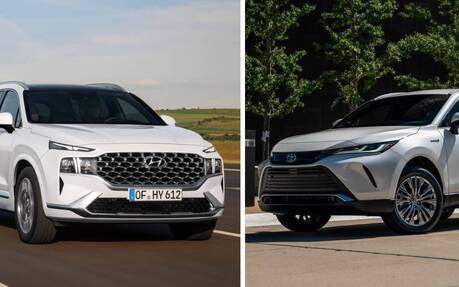2021 Hyundai Santa Fe vs. 2021 Toyota Venza: The Numbers
The freshly updated 2021 Hyundai Santa Fe and all-new 2021 Toyota Venza are two attractive midsize SUVs with available hybrid powertrains.
How do they compare? Which one should you buy? We have crunched the numbers to help you out.
- Also: 2021 Hyundai Santa Fe Pricing Announced, Including Hybrid Model
- Also: 2021 Hyundai Santa Fe Coming Soon With Two Hybrid Variants
Powertrain: Advantage Santa Fe
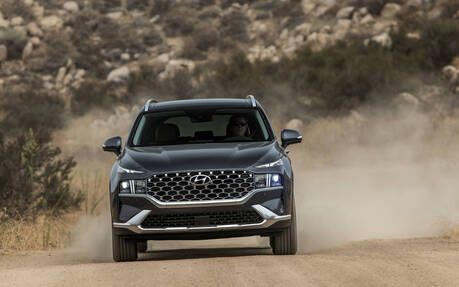
Toyota makes it simple: the Venza is exclusively powered by a hybrid system, one that combines a 2.5-litre four-cylinder engine with two electric motors and a CVT for a total of 219 horsepower.
Meanwhile, Hyundai offers the Santa Fe with a pair of 2.5-litre engines. One is naturally aspirated and delivers 191 horsepower; the second is turbocharged and boosts output to 277 horsepower. Both have an eight-speed automatic transmission—a conventional one and a dual-clutch unit, respectively. The smaller engine is available with FWD or AWD, while the turbo can be had with AWD only.
Wait, there’s more: the first-ever Santa Fe Hybrid combines a turbocharged 1.6-litre engine with a 44-kilowatt electric motor and a 1.5-kWh battery to deliver 226 horsepower and 258 pound-feet of torque. AWD and a six-speed transmission are also included. A plug-in hybrid variant with more power and reasonable EV range will follow later in 2021.
Fuel Economy: Advantage Venza
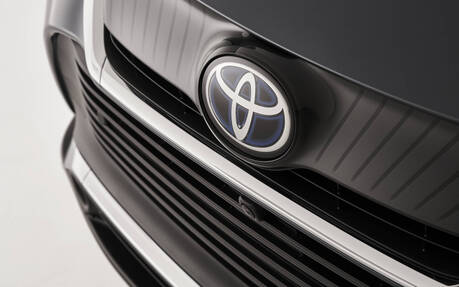
In FWD configuration, the 2021 Santa Fe achieves 9.1 L/100 km in combined city-highway driving. If you opt for AWD, expect 10 L/100 km.
As far as the hybrids are concerned, Hyundai’s model is rated 7.4 L/100 km on average, which is fairly less efficient than the Venza at 6.1 L/100 km. Clearly, the latter has the edge here, and it’s no surprise given Toyota’s proven hybrid technology.
Utility: Advantage Santa Fe
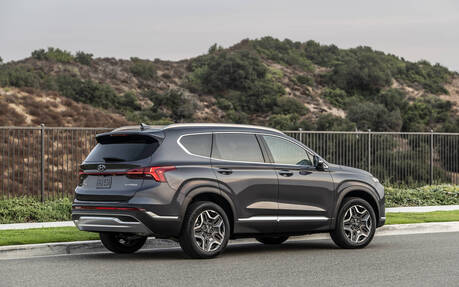
Both the Venza and Santa Fe are five-passenger SUVs. The Korean rival is larger and thus offers more cargo room, but only marginally so—1,032 litres in the trunk versus 1,027 litres for the Venza. With the rear seats folded, you get 2,041 litres in the Santa Fe. Toyota does not disclose total cargo capacity.
Roof rails and a power liftgate are available on both. When it comes to towing, the Santa Fe can pull up to 1,270 kilograms (2,800 pounds) with the base engine or 1,588 kilograms (3,500 pounds) with the turbo engine. Towing is not recommended with the Venza.
Safety: Tie
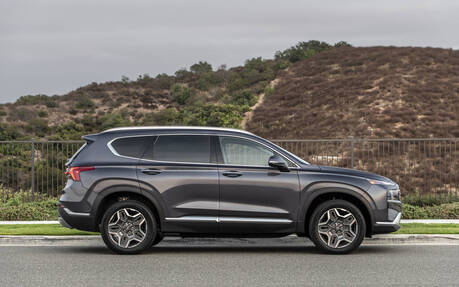
The 2021 Toyota Venza earned a “Top Safety Pick” rating from the Insurance Institute for Highway Safety (IIHS). The Hyundai Santa Fe did too in 2020, but the 2021 model has yet to be rated. We expect it will get a similar accolade.
The Venza comes standard with Toyota Safety Sense 2.0, a suite of active safety systems that includes a Pre-Collision System with Pedestrian Detection and Bicycle Detection, Dynamic Radar Cruise Control, Lane Departure Alert with Steering Assist, Lane Tracing Assist and Automatic High Beams.
The Santa Fe strikes back with Hyundai SmartSense features such as Forward Collision Avoidance-Assist with Pedestrian, Cyclist and Junction-Turning Detection, Parking Collision Avoidance Assist in Reverse and Highway Drive Assist.
Technology: Advantage Santa Fe
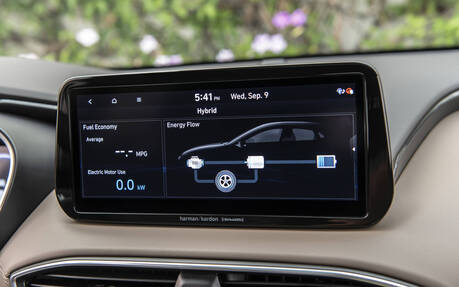
The two vehicles offer a modern, high-tech environment for drivers with an eight-inch centre display as standard equipment. Optionally, the Venza is available with a 12.3-inch screen, while the Santa Fe boasts a 10.25-inch screen. Apple CarPlay and Android Auto compatibility is included in both.
There are several USB ports throughout and available wireless charging for smartphones, plus a high-quality audio system and head-up display. The Santa Fe’s optional instrument cluster is a 12.3-inch display, while the Venza’s is limited to seven inches. Because of that, not to mention superior graphics and better ergonomics, we give the edge to Hyundai.
Pricing: Advantage Santa Fe
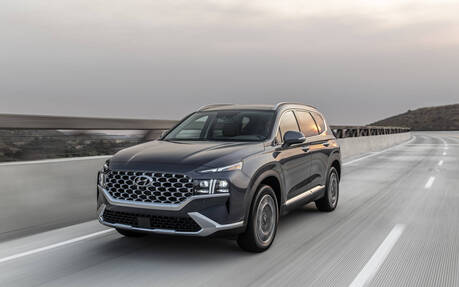
All trim levels considered, the 2021 Hyundai Santa Fe is much more affordable than the Venza due to its gas-only models. In the battle of hybrids, however, the Venza starts at a lower price than the Santa Fe Hybrid. MSRPs are as follows:
- Hyundai Santa Fe
- Essential: $31,399
- Preferred: $36,399
- Preferred Trend Hybrid: $41,399
- Luxury Hybrid: $43,799
- Ultimate Calligraphy: $47,499
- Toyota Venza
- LE: $38,490
- XLE: $44,490
- Limited: $47,690
Remember that Hyundai offers much lower rates than Toyota including 1.49% over 60 months versus 3.99% (at the time of writing).
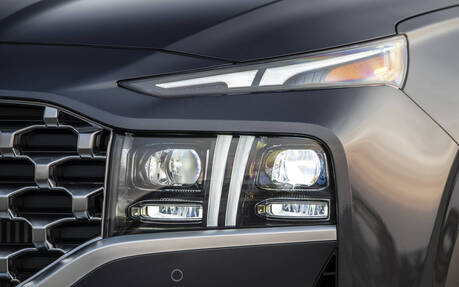
Warranty: Advantage Santa Fe
Coverage is identical across the line except for the limited vehicle warranty, which is 5 years/100,000 km in the case of Hyundai and 3 years/60,000 km in the case of Toyota. Customers also get:
- 5 years/100,000 km powertrain warranty
- 5 years/unlimited km rust warranty
- 8 years/160,000 km hybrid system warranty
